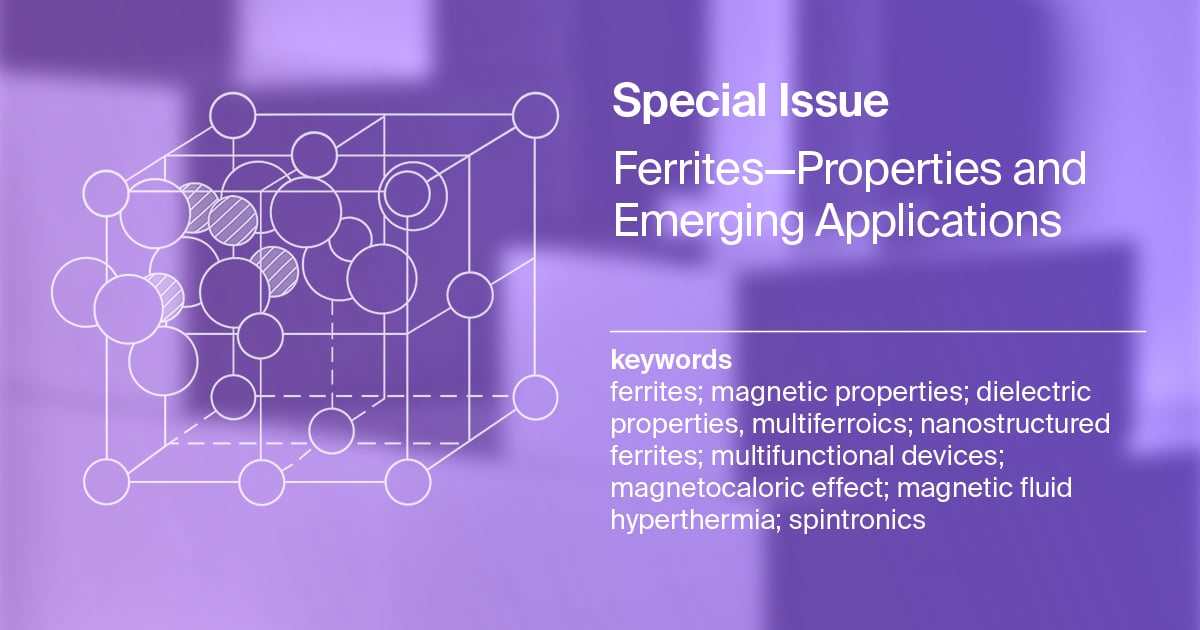- 2.4Impact Factor
- 4.5CiteScore
- 19 daysTime to First Decision
Ferrites—Properties and Emerging Applications
Special Issue Information
Dear Colleagues,
Ferrites represent a unique class of ceramic materials that combine ferromagnetic behavior with high electrical resistivity, making them indispensable for a wide range of technological applications: from magnetic recording and microwave devices to biomedical diagnostics and power electronics, among others. The continuing evolution of ferrite materials is driven by advances in their synthesis, doping, nanoscale engineering, and theoretical modeling, which together expand their functionality and open up new directions for their application.
This Special Issue aims to present the latest research on the synthesis, structural characterization, magnetic and transport properties, and multifunctional behavior of ferrites in their bulk, thin-film, and nanostructured forms. The contributions also address the growing relevance of ferrites in spintronics, magnetocaloric refrigeration, wireless power transfer, environmentally friendly magnetic materials, and other emerging fields.
We welcome submissions focused on, but not limited to, the following topics:
- The structural, magnetic, and dielectric characterization of ferrite systems;
- The effects of substitutional doping and cation distribution on ferrite properties;
- The synthesis, surface modification, and applications of magnetic nanoferrites;
- The use of ferrites in biomedical, microwave, or energy storage/conversion devices;
- The modeling of magnetic and electrical behavior in ferrite-based systems;
- The use of ferrites as sustainable and low-cost materials for green technologies.
We hope that this Special Issue will serve as a reference for researchers in the fields of magnetism, materials science, and applied physics, as well as act as a platform to encourage collaboration between experimentalists and theorists. By highlighting the rich diversity and enduring relevance of ferrites, we aim to inspire both fundamental investigations and innovation-driven research.
Dr. Carlos Amorim
Guest Editor
Manuscript Submission Information
Manuscripts should be submitted online at www.mdpi.com by registering and logging in to this website. Once you are registered, click here to go to the submission form. Manuscripts can be submitted until the deadline. All submissions that pass pre-check are peer-reviewed. Accepted papers will be published continuously in the journal (as soon as accepted) and will be listed together on the special issue website. Research articles, review articles as well as short communications are invited. For planned papers, a title and short abstract (about 250 words) can be sent to the Editorial Office for assessment.
Submitted manuscripts should not have been published previously, nor be under consideration for publication elsewhere (except conference proceedings papers). All manuscripts are thoroughly refereed through a single-blind peer-review process. A guide for authors and other relevant information for submission of manuscripts is available on the Instructions for Authors page. Solids is an international peer-reviewed open access semimonthly journal published by MDPI.
Please visit the Instructions for Authors page before submitting a manuscript. The Article Processing Charge (APC) for publication in this open access journal is 1200 CHF (Swiss Francs). Submitted papers should be well formatted and use good English. Authors may use MDPI's English editing service prior to publication or during author revisions.
Keywords
- ferrites
- magnetic properties
- dielectric properties, multiferroics
- nanostructured ferrites
- multifunctional devices
- magnetocaloric effect
- magnetic fluid hyperthermia
- spintronics

Benefits of Publishing in a Special Issue
- Ease of navigation: Grouping papers by topic helps scholars navigate broad scope journals more efficiently.
- Greater discoverability: Special Issues support the reach and impact of scientific research. Articles in Special Issues are more discoverable and cited more frequently.
- Expansion of research network: Special Issues facilitate connections among authors, fostering scientific collaborations.
- External promotion: Articles in Special Issues are often promoted through the journal's social media, increasing their visibility.
- Reprint: MDPI Books provides the opportunity to republish successful Special Issues in book format, both online and in print.


